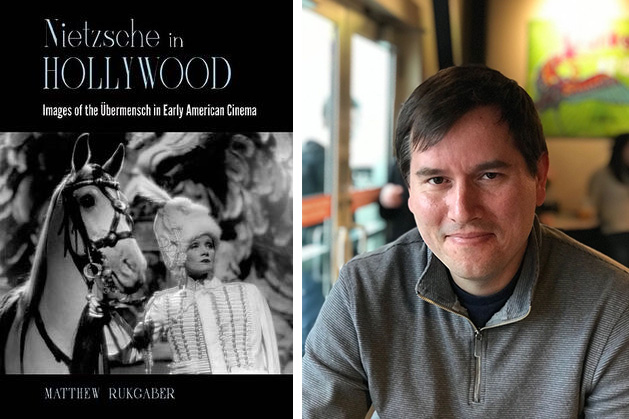- Apply
- Visit
- Request Info
- Give



Published on March 30, 2022

Matthew Rukgaber, lecturer in the Department of Political Science, Philosophy and Geography, has published a new book, “Nietzsche in Hollywood: Images of the Übermensch in Early American Cinema.” SUNY Press, the publisher, said the book offers a compelling and startling history of Hollywood film in which the German philosopher Friedrich Nietzsche and his idea of the Übermensch looms large.
The publisher goes on to say that the Nietzsche’s philosophy “undergoes a series of cinematic and philosophical transformations in the 1920s and 1930s under the eye and pen of some of the most significant names in early Hollywood, including Erich von Stroheim, Josef von Sternberg, Ben Hecht, Howard Hawks and Ernst Lubitsch.” The book “reveals a reading of the philosopher in American culture that has largely been ignored.”
Rukgaber said Nietzsche’s philosophy was intended to look critically at our most sacred ideas and institutions. “By showing that many films from the 1910s, 1920s and 1930s have a direct influence from the American reception of Nietzsche’s philosophy, this book shows how this cinematic tradition, which many people might look at as quaint, unsophisticated relics of the past, actually contains radical philosophical challenges to traditional notions of morality, gender, the law, love, selfhood, reason, time and truth. Such challenges to our institutions are valuable, not because they redeem what exists but because they point to a possible future with different institutions.”
“This book makes a strong and compelling case for the dynamic influence of Nietzsche’s philosophy on American film culture of the 1910s and 1920s, exploring the transgressive value systems embedded within both canonical and lesser known Hollywood films of the era,” said Trevor Mowchun, assistant professor and director of film and media studies at the University of Florida. “Not only film scholars but philosophers too will find much to dwell on in this surprising discovery of Nietzsche’s most demanding and edifying ideas in early American film.”
Rukgaber explains why he believes the book is a great read: “The first time I read Stanley Cavell’s 1984 book ‘The Pursuits of Happiness: The Hollywood Comedy of Remarriage,’ as an undergraduate, I literally jumped out of my seat! Movies that I had seen many times growing up were revealed to have philosophical depth that I never suspected. It was like a veil being lifted, and I was being taught how, for the first time, to read and understand film. I hope that, for some readers, the same experience might occur. Films that seem like a simple tale of ‘the rise and fall of a gangster’ or of ‘a love affair between a soldier and a cabaret singer’ are exposed as being about a battle between forces — psychological, historical, metaphysical — in humans, who are faced with the challenge to be more than merely human.”
Rukgaber said he hopes that the book leads people to appreciate the history of American film more. “Even if people know very little philosophy, they at least have a sense of its value as intellectual history and as the inspiration for a number of modern science-fiction films. Early Hollywood film has been seen as technically unsophisticated entertainment for around 100 years. Its intellectual value has been largely ignored in American culture. It would be nice if, in some indirect way, that this book leads to more study of this era of film, whether that is via Hollywood itself or in academia.”
Written by Dwight Bachman